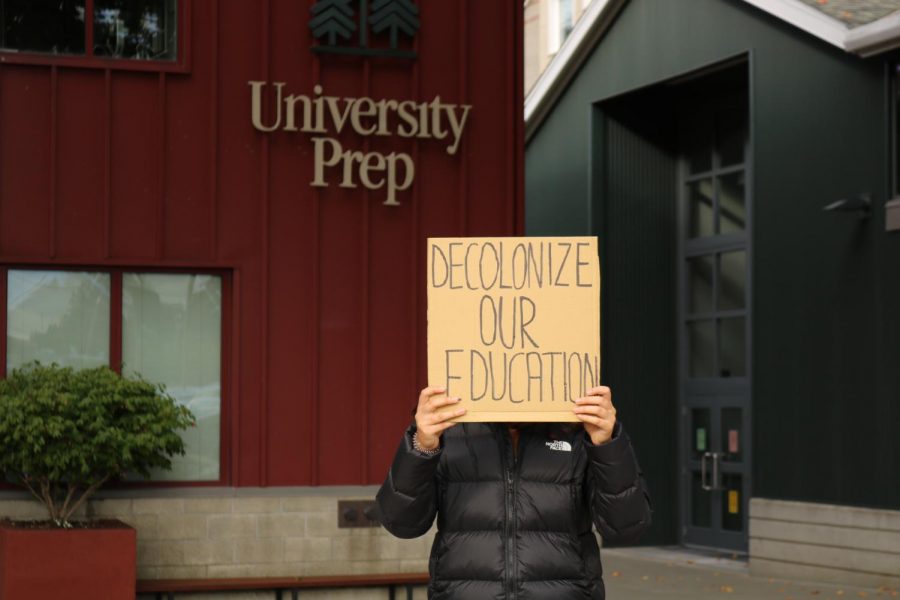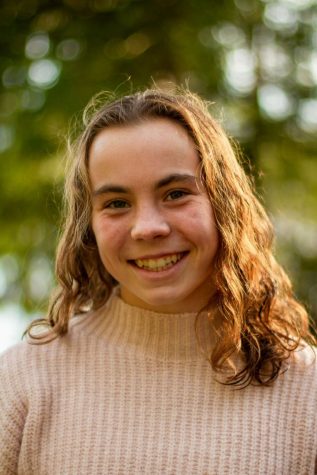A Call For Inclusivity
Students demand change to UPrep’s curriculum
Photo: Aidan Lee
Students created the Students for Social Justice organization in an attempt to decolonize UPrep’s curriculum.
With the presidential election just weeks away and following a summer of high racial tensions, thousands of inspired youth across the United States are calling for racial justice in their schools, communities, and governments. Among the list of teens are University Prep juniors Ananya Randeria and Siona Wadhawan.
Randeria and Wadhawan created the Students for Social Justice organization over the summer aiming to decolonize UPrep’s curriculum. In their eyes, to decolonize a curriculum means to dismantle colonial systems of oppression and diversify representation throughout materials.
“Our main goal is to create a community that’s more inclusive, diverse and open to race conversations, and to represent the entire student body, not just the majority of the student body,” Randeria said.
Coming from experience at many different schools, including his most recent job at a conservative school in Virginia, new Director of Upper School Joel Sohn helped develop more diverse and decolonized curricula. Sohn believes efforts to diversify curricula must be approached with intention and thought in order to be effective.
“Schools have gotten away for too long without really thinking hard about what they’re doing and why they’re doing it,” Sohn said. “I don’t think UPrep is immune.”
Randeria, for example, wishes students would learn more about the history of the N-word rather than only being told not to use it.
“When we go into high school, we don’t really know why the N-word is a bad thing to say. We briefly gloss over it and never really dig into the why of it,” Randeria said.
Senior Joseph Yeung runs Asian Pacific Islander Student Union and is a member of SSJ. He believes a decolonized curriculum goes beyond just talking about language.
“It’s important that we’re teaching a curriculum that’s targeted to a diverse audience because we have to be able to address all the different identities and backgrounds that make up our student body,” Yeung said.
Randeria acknowledged that UPrep does have many diverse course options and is moving toward a more representative curriculum. For example, Randeria believes her course Hyphenating America which explores identity is a step in the right direction.
Previous English department head Carl Faucher oversaw changes in upper-level elective courses during his time as department head. He believes the flexibility coming from the department’s curriculum changes over the past five years has allowed educators the opportunity to expand what they teach.
“Creating [this] curriculum gave teachers the flexibility to pick what they wanted the kids to read,” Faucher said. “And my observation was that teachers were taking advantage of that opportunity to look at literature through a different lens, so literature that wasn’t so steeped in European English tradition, but also literature from different places in the world.”
Director of Diversity and Community and Director of Hiring E-Chieh Lin agrees there is a need to critically think about which materials are being chosen.“We always want to think that history is written accurately or factually,” Lin said. “(But) it depends on who’s writing it. Whoever writes it will provide part of their own subjective nature, and being able to provide different people who write different perspectives of history will give us that ability to critically think about which ones do we find to be most accurate.”
Meanwhile, Sohn still believes that when it comes to decolonizing the curriculum, it is not just about the material, but about how the material is taught.
“I could change every single book in the University Prep curriculum and still be teaching a colonized mindset. So it’s less about decolonizing the curriculum and (more about) thinking critically about how teachers engage with material,” Sohn said.
According to Assistant Head of School for Academics and Strategic Initiatives Richard Kassissieh, in the last five years UPrep has been particularly responsive to the requests and demands of students wishing to diversify their curriculum. For example, the history department created a diverse set of electives juniors can choose from rather than one traditional United States history class.
“One benefit of being an independent school is we have a lot more independence. We still have to be aware and mindful of the standards for subject areas that are out there, but ultimately we get to control our own curriculum and that does give us freedom to move more quickly when times change,” Kassissieh said.
Kassissieh noted these changes came in response to students’ requests for a more inclusive curriculum.
“I think that there are ways for students to influence the curriculum. But I wouldn’t pretend that those ways are very numerous,” Kassissieh said.
Kassissieh acknowledged that opportunities such as Academic Council do exist for elected students to advocate and vote on behalf of the student body alongside teachers.
History teacher Abigail Hundley teaches an elective United States history class on race and immigration. She noted that, in previous years, it has been difficult to keep the class running due to varying interest and registration.
“We can offer all these courses, and we have been offering these courses for decades,” Hundley said. “But if students aren’t really excited about it, then it doesn’t matter.”
Lin also noted efforts to decolonize curriculums through faculty professional development, a program where teachers choose an aspect of teaching they want to improve upon and devote a three-year project to their goal.
Teachers and students alike are looking for ways they can help improve the curriculum by both doing their individual part and working together.
Junior and Community Ethics and Culture Committee representative Maylin Gasga wants to see a curriculum as diverse as the student body.
“When you see yourself reflected in your curriculum, it makes you want to learn more and it makes you feel like your experiences are being shared and they’re important,” Gasga said.
Randeria agrees.
“[The goal is to] be able to walk into the classroom knowing that you’re going to see yourself in what you learn, ” Randeria said.
Your donation will support the student journalists of UPrep.

Emma Serralles is the Copy Editor of the Puma Press and has been on staff for three years. Her favorite stories to write are features and news stories....


